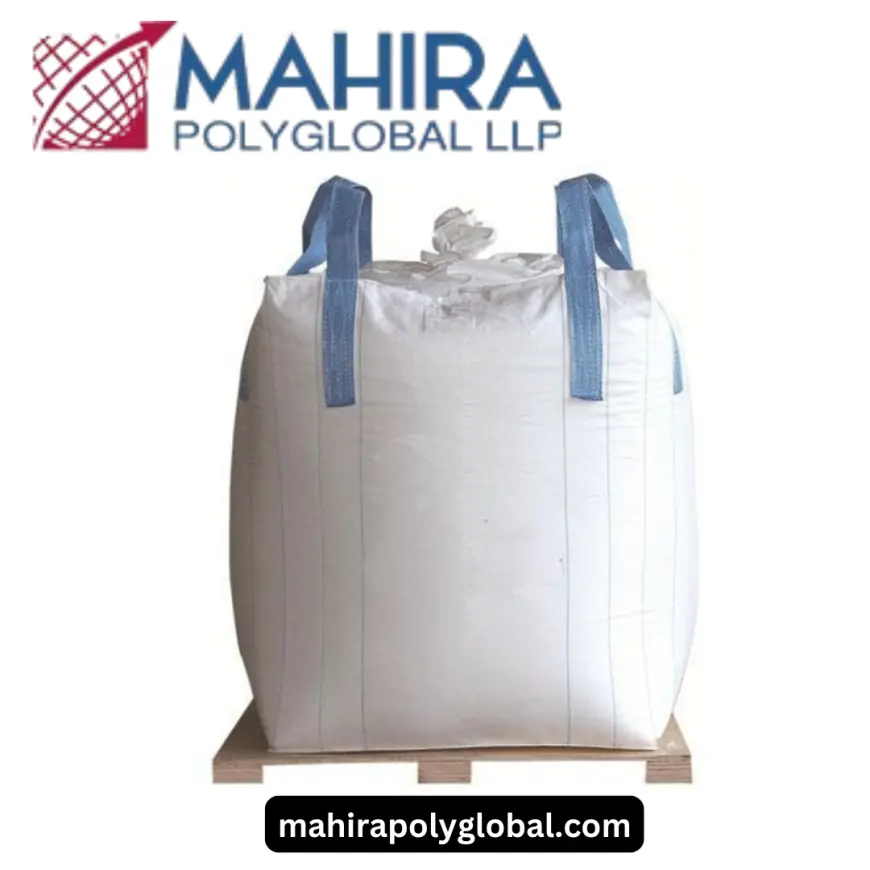Understanding PP Jumbo Bags: An Essential Packaging Solution

PP jumbo bags, also known as bulk bags or plastic big bags, are versatile packaging solutions designed to store and transport large quantities of materials across various industries. Made from woven polypropylene, these bags have gained widespread popularity due to their strength and adaptability. From agriculture to construction, the applications of PP jumbo bags are virtually limitless. This Mahira Polyglobal LLP delves into the characteristics, benefits, manufacturing processes, and the growing market trends of these essential packaging solutions, shedding light on why they remain a favored choice for businesses worldwide.
The Unique Characteristics of PP Jumbo Bags
One of the standout features of PP jumbo bags is their remarkable strength and durability. Constructed from woven polypropylene fabric, these bags can withstand heavy weights—often exceeding 1,000 kilograms—without losing structural integrity. This strength makes them ideal for various applications, such as transporting builder's sand, chemicals, agricultural products, and more. The bags are also resistant to tears and punctures, ensuring that the contents remain safe and intact during storage and transport.
Another significant characteristic is the versatility in design. PP jumbo bags come in different shapes, sizes, and configurations to meet specific needs. They can be equipped with features like duffle tops, spouts for easy filling and emptying, and various closure methods. Furthermore, businesses can have them printed with custom logos or important information, allowing for brand visibility while maintaining functionality. This adaptability caters not only to diverse industries but also to individual customer preferences, making PP jumbo bags an excellent packaging solution for many businesses.
Diverse Applications Across Industries
The Bags manufacturers in India are utilized in a vast array of industries, showcasing their flexibility. In agriculture, these bags are essential for storing and transporting fertilizers, grains, seeds, and animal feeds. Their excellent moisture resistance and pest-protection capabilities ensure that the stored products remain unspoiled and safe for consumption.
In the construction sector, PP jumbo bags are indispensable for carrying materials like sand, gravel, and cement. They streamline operations by allowing for the efficient movement of large quantities, reducing the need for multiple trips and minimizing spillage or damage. The longstanding usage of these bags in construction not only enhances safety but also boosts productivity on job sites.
The chemical industry also finds value in PP jumbo bags. Many manufacturers use these bulk bags to store powders, granules, and other bulk chemicals. The flexibility in design enables considerations such as safe handling, ensuring regulatory compliance for hazardous materials. By utilizing a combination of high-quality materials and manufacturing processes, PP jumbo bags offer a reliable solution for various chemical storage and transport needs.
Understanding the Manufacturing Process
Creating robust PP jumbo bags involves several stages, combining quality materials and advanced technology. The process begins with the extrusion of polypropylene resin, where the resin is heated and formed into thin sheets. These sheets are then woven together to create the durable fabric used for the bags. This step crucially enhances the strength and tear resistance of the final product.
After the fabric is produced, it is cut and sewn into various bag designs, depending on customer specifications. Many manufacturers leverage automated machinery to ensure precision and efficiency during this process, resulting in high-quality bags at a competitive rate. Each bag undergoes stringent quality control tests according to international standards, verifying the load capacity and durability before reaching the market.
An essential aspect of modern manufacturing is the incorporation of sustainability practices. Many companies are beginning to integrate recycled materials into their production processes, thereby addressing environmental concerns associated with plastic use. This shift not only benefits the company by reducing material costs but also appeals to environmentally conscious consumers.
Advantages of Using PP Jumbo Bags
The benefits of using PP jumbo bags extend far beyond their physical attributes. One of the main advantages is their cost-effectiveness. Given their capacity for reuse—typically lasting for several cycles—these bags greatly reduce the need for frequent replacement. This characteristic translates into lower packaging expenditures for businesses, making them an attractive option for many industries.
Another significant draw is the ease with which PP jumbo bags can be stored and transported. When empty, these bags can be conveniently folded into a compact shape, saving storage space. This efficiency is particularly advantageous for logistics, allowing distributors to optimize warehouse space and reduce costs.
Furthermore, PP jumbo bags are tailored for environmental resilience. They possess excellent resistance to moisture, UV radiation, and chemicals, ensuring that contents are protected regardless of external conditions. This durability not only safeguards materials but also reduces the risk of spillage during transport, enhancing safety and efficiency in operations.
Environmental Considerations and Sustainability Efforts
As environmental concerns mount, the production and disposal of plastic products like Jumbo bag manufacturers in India are under scrutiny. Polypropylene, the primary material used for these bags, is recyclable, and many manufacturers are now adopting sustainable practices to mitigate environmental impact. Initiatives such as implementing recycling programs encourage businesses to return used bags for recycling, thereby reducing landfill waste.
Moreover, companies are beginning to incorporate eco-friendly practices into their manufacturing processes, such as utilizing renewable energy sources and minimizing water usage. By adopting innovative solutions, manufacturers can lower their carbon footprint while producing reliable products. As consumers increasingly demand sustainability in products, the packaging industry—including PP jumbo bags—continues to evolve to meet these expectations.
Education is also crucial. Many manufacturers are taking steps to inform customers about the proper disposal and recycling of PP jumbo bags, fostering an awareness that promotes responsible consumption and waste management. By implementing these initiatives, both manufacturers and consumers contribute to creating a more sustainable future.
The Future of PP Jumbo Bags
The increasing demand for PP jumbo bags is set to grow, driven by the expanding industries relying on bulk packaging solutions. Emerging markets, particularly in developing regions, will likely witness substantial growth as infrastructure improvements—especially in agriculture and construction—expand. Businesses in these areas are turning to bulk bags as they seek efficient options for transporting goods.
Innovations in material science and technology will also shape the future of PP jumbo bags. Manufacturers are exploring advancements in bag design, such as incorporating lightweight yet high-strength materials that further enhance performance. For instance, developments in bio-based polypropylene could result in the creation of even more sustainable options for packaging, providing businesses with environmentally friendly alternatives that do not compromise on quality.
Additionally, the trend toward customization is likely to continue. As companies strive for unique branding and specific functionality, providers of PP jumbo bags will need to adapt quickly to fulfill diverse customer requirements. The landscape of bulk packaging will change, allowing for both enhanced durability and tailored designs that suit individual needs.
Conclusion
PP jumbo bags represent an invaluable packaging solution across countless industries due to their unmatched strength, versatility, and cost-effectiveness. As businesses increasingly seek efficient ways to transport and store bulk materials, these bags remain a trusted choice. Their adaptability to various applications, commitment to sustainability, and innovative future prospects affirm their position as essential components of modern logistics and supply chains.
As we move forward, monitoring market trends and technological advancements will be crucial for stakeholders in the packaging industry. Emphasizing sustainable practices and continuing to innovate will ensure that Jumbo bag supplier not only meet current needs but also contribute to a more responsible and eco-conscious future.
Frequently Asked Questions
1. What are PP jumbo bags typically used for?
PP jumbo bags, often referred to as plastic big bags, are commonly used to store and transport bulk quantities of materials, including grains, fertilizers, construction materials, and chemical products across various industries.
2. How much weight can a standard PP jumbo bag hold?
PP jumbo bags are designed to hold substantial weights, generally ranging from 500 kg to 2,000 kg (about 1,100 to 4,400 pounds), depending on the specific design and construction of the bag.
3. Are PP jumbo bags recyclable?
Yes, PP jumbo bags are recyclable and can often be reused multiple times before disposal. Many manufacturers offer recycling programs, encouraging consumers to return used bags to minimize environmental impact.
4. Can PP jumbo bags be customized?
Absolutely! PP jumbo bags can be tailored to meet specific customer requirements, including size, shape, specialized features like spouts or duffle tops, and branding options through custom printing.
What's Your Reaction?
 Like
0
Like
0
 Dislike
0
Dislike
0
 Love
0
Love
0
 Funny
0
Funny
0
 Angry
0
Angry
0
 Sad
0
Sad
0
 Wow
0
Wow
0

















































